Refael Bashan: Honorable Rabbi, shall we begin with a few biographical details?
Chief Rabbi, Rishon Letzion Ovadia Yosef (softly): "I was born in Baghdad in Iraq in the year 1920."
What did your father do?
"Father was a gold and silver smith. When I reached the age of four, we moved to Israel and my father opened a grocery store."
What was the financial state at home?
"(reflecting) Moderate. You can say it was moderate."
"Father has been studying in a yeshiva for the last few years."
In Egypt, they thought I was a spy
Where did your honor study?
"At first I studied Talmud-Torah at Bnei Tzion in the Bukharian quarter in Jerusalem, then I moved on to the Porat Yosef yeshiva, there I met my rabbis and teachers the Rabbi Yaakov Ades and Rabbi Ovadia Hadaya. At the age of 17 I penned the first pamphlet from my 'Yabia Amor' series in which I researched the Tannaim and Amoraim (Talmudic sages and scholars).
"(Proudly) At the age of 20 I was ordained by the Rishon Letzion Rabbi Ben Zion Hai Uziel (of blessed memory) to serve as a justice in the Sephardic rabbinical court. I served in the position for three years and then Rabbi Uziel called upon me to move to Cairo to serve as chief justice (in the rabbinical court) and deputy chief rabbi to Rabbi Haim Nahum Effendi (of blessed memory).
"Because of his old age and frail condition, at times I would represent Rabbi Nahum before the powers that be. I recall visiting King Farouk, to pay his respects on his birthday, despite the fact that we are talking about 1948, at the height of the War of Independence; I was treated with royal respect and an honor guard of police and soldiers who saluted me outside the palace.
What did you (and the king) discuss?
"(Simply) It was just polite talk. We drank steaming hot coffee and shook hands.
What was Faruk's relation to Egyptian Jewry?
"It was OK. But when Egypt began to suffer defeats on the battlefield, the situation deteriorated. Regarding myself, they began to (absurdly) suspect that I was an Israeli spy. Occasionally, we were surprised by searches by the secret police. I remember one night Egyptian officers broke into our house with guns, demanding: 'Where is your gun?' I told them: 'You want to know where my gun is, come, I'll show you'. And I took them to my library and said: 'Here, here are my weapons'.
"Afterwards the Egyptians began spreading rumors that I was disseminating Zionist propaganda, and they berated me for giving speeches in Hebrew. The truth of the matter was that they were right; I was telling worshipers to do everything in their power to come to Israel through Italy and France. Regarding the Hebrew issue I told the Egyptian authorities that I am speaking the language God gave the people of Israel.
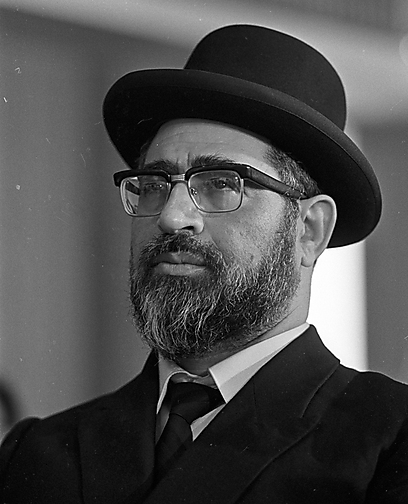
Rabbi Yosef in Cairo (Photo: David Rubinger)
"After three years, at the end of 1950 when my contract ended, I returned to Israel and was appointed a justice in Petah Tikva. In 1958 I moved to Jerusalem to serve as a justice and in 1965 I began serving in the (rabbinical justice system's highest) appellate court. In 1968 I was elected to the position of Chief Justice of the Rabbinical Court and Chief Rabbi of Tel Aviv-Jaffa. I wrote six books: Hazon Ovadia (Ovadia's Vision) and five volumes of "Yabia Amor" which included rulings on topical issues regarding the Shulchan Aruch (the Code of Jewish Law). For them I won the Rabbi Kook Prize, the Rabbi Uziel Prize and in 1970 the Israel Prize.
I found a friend in Rabbi Goren
What was the relationship between your honor and Rabbi (Shlomo) Goren?
"(Warmly) Our relationship was very very good and very cordial; we always discussed manners pointedly and with full understanding. Rabbi Goren found in me a friend and equal, and I found the same in him. Together we solved no small amount of complex problems and I can only hope we'll continue to do so.
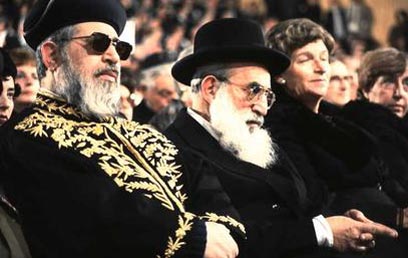
Rabbi Yosef with Rabbi Goren (Photo: Moshe Milner, GPO)
And what about Rabbi (Isser Yehuda) Unterman?
"Relations were proper, even though we met only once in a long while. There was mutual respect between us, (I had much esteem for) Rabbi Unterman as a learned man, a real respectable gentleman."
And Rabbi (Yitzhak) Nissim?
"(With resentment) Unfortunately our relations were not proper at all, even though there was a time when he saw me as his natural heir.
"That was in 1955, after Rabbi Nissim was elected Rishon Letzion (chief rabbi) and I came to congratulate him, and he said this: 'I know you will rule in my stead and sit in my chair!' He then immediately asked me to answer a number of (religious) queries and pointed to a pile of letters he received after winning the election. I couldn't heed his request, because my mind was busy with a book, and Rabbi Nissim found someone else to do it. Since then our relations have soured."
Miracles for Nissim
"The tensions with Rabbi Nissim peaked in the 1960 elections for the Chief Sephardic Rabbi. I was approached by Rabbi Tzi Pessah Frankel (of blessed memory) who told me 'Rabbi Nissim is destroying the rabbinate; you must take the position of Rishon Letzion yourself!' I answered him: 'I am only 39, maybe during the next term, in five years.' But Rabbi Frankel said that if things were to continue as they are now, not a shred of the rabbinate would remain in five years time. (Reluctantly) Well, I said OK, and I put my candidacy forward as did Rabbi Goren (for the position of Chief Ashkenazi Rabbi), and the radical haredim boycotted the elections, fearing Goren.
"(Smiling) and thus we did miracles for Nissim, because the government extended his tenure, and then because of the Lavon incident the government decided again that it was not fitting to hold elections for the chief Sephardic rabbinate. For years, a bloc was formed around Nissim (somberly) and I learned there was no chance, so I withdrew my candidacy. (Eventually) Rabbi Unterman beat Goren by a small fraction of the votes.
"When their terms were nearing their end, I was approached by sages and public officials to run again. However, I was warned Nissim would again try to postpone the elections and I was forced to wait until the High Court and Election Committee took control of the elections and immediately afterwards I announced my candidacy.
"(Gratefully) a few torah students worked hard and explained to the voters their position (regarding me) and thank God I was elected."
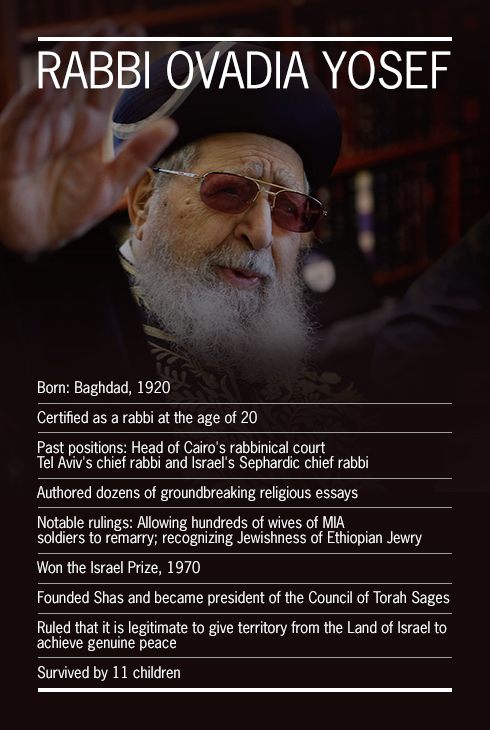
We're you surprised to hear that you won?
"(Decisively) No! I received hourly updates on a daily basis. The Yeshiva students left no stone unturned and talked to every rabbi and wheeler-dealer."
Eleven sons and daughters
Rabbi Ovadia sits in his apartment in the heart of Rothschild Boulevard, in a study crammed with religious books reaching from wall to wall and from floor to ceiling. He is of average height with kind eyes, genteel, friendly and modest. Those well involved in the rabbinical world say that he is a Gadol BaToarh, a profound religious interpreter well versed in both the Halacha (religious law) and contemporary issues. The rabbi has been blessed with 11 sons and daughters who sit planted like seedlings around his table.
There was a suggestion that Rabbi Goren and yourself will serve as Jerusalem's Chief Rabbis (in addition to being Chief Rabbis of Israel).
"We are still considering the offer. The problem is that chief rabbis must serve as the head of the local rabbinical courts, and if we are Chief Rabbis of Israel and Chief Rabbis of Jerusalem that would mean we would be the heads of both Jerusalem's Rabbinical Court and the High Rabbinical Appellate Court, and it is improper to serve in both courts at the same time. (Sighing) Not to mention the heavy workload that a Chief Rabbi faces. (After pondering the issue for a few seconds) maybe it is best that there will be an independent chief rabbi for Jerusalem.
Does you honor believe in putting an age limit on chief rabbis?
"Yes, definitely."
To which age?
"Seventy, maybe 75. The head of the rabbinical court should retire at 75."
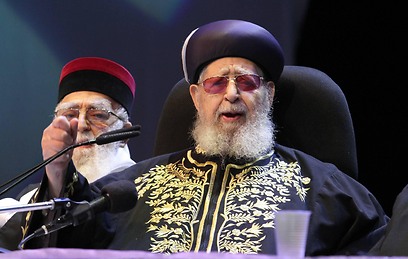
Talmudic scholar, halakhic authority (Photo: Gil Yohanan)
Should the rabbinate get in touch with the people and be more involved in everyday affairs?
"(Excitedly): Definitely, definitely! There is a need to reach out, to give speeches and try to sway people in a pleasant way. I have come to learn that there are people who have never tasted the fruits of the Torah, or drunk the meditations of the scripture and the words of Hazal (our Sages of Blessed Memory), as one of our prophets said: 'Behold, the days come, saith the Lord God, that I will send a famine in the land, not a famine of bread, nor a thirst for water, but of hearing the words of the Lord'.
"(Energetically): I have become accustomed to visiting prisoners and urging them to pray. They prayed with me with such devoutness, it was as if we were praying on Yom Kippur! I see a great thirst for the word of God. I give lectures on Talmud in the Yemenites' Quarter and the Tikva neighborhood (in Tel Aviv) and in Bat Yam and Holon. I believe that people who seem estranged, deep in their heart want faith and there is hope to return them to the bosom of tradition."
Reasons for leniency
What is your honor's opinion regarding the issue of bastards and those disqualified for marriage?
"(Intensely): At the time, I offered Rabbi Nissim who was serving as head of the appellate court to convene all of the justices to rethink the issue in light of the new research conducted by Rabbi Goren.
"(With slight anger): But Rabbi Nissim refused my request, despite the support of the rest of the justices. My offer still stands, and I am ready to sit with my counterpart Rabbi Goren, study the matter and publish a ruling."
What are the chances?
"(With cautious optimism): It is possible there is a way to release them (of their problematic status). If we will find a Talmudic basis, we would be more than happy to release them and there is no doubt in my mind that those who have barred them (from marriage) would move towards leniency if they were to examine the evidence cited by Rabbi Goren."
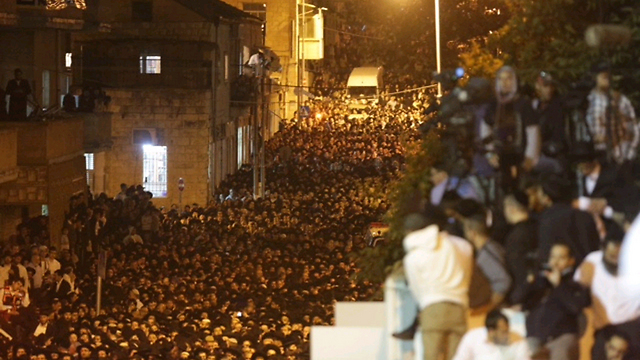
850,000 attend Rabbi Yosef's funeral (Photo: Ohad Zwigenberg)
Does your honor usually rule with leniency (lekula)?
"I'll quote a review by Rabbi Nissim of my books Yabia Amor: (Quoting) In every question he intertwines ancient with contemporary (opinions) with master proficiency. He has a great ability to create practices from the Halacha, but in some cases he ruled with leniency and I wanted to entertain myself with his words but I became so bothered that I could never do so."
Is your honor affiliated with any one party?
"As far as I know, the chief rabbi must be above all parties."
To conclude this topic: Would you say that his honor is affiliated with Beit Hillel?
"Thank god that has always been my way. Those working with me on issues like marriage and kashrut, for example, know that I always make an effort to find a basis for leniency."
And what about conversion?
"(Sternly): Giur (conversion) must always be done according to Halacha (Jewish law). Giur which is not according to the Halacha has no value.
What about reform conversion?
"No value whatsoever."
Torah and soldiers
Does you honor believe that Yeshiva students should be exempt from serving in the IDF ?
"(Unhesitatingly): Yes. We believe that the Torah of Israel, over which these students slave day and night, protects IDF soldiers in whatever battles they may face, as it is written: 'Not by might, nor by power, but by my Spirit, says the Lord of hosts'."
What will be your first order of business as Chief Rabbi?
"Firstly we must restore the crown to its former glory. (this phrase eventually became the political party Shas's slogan)."
What is your opinion regarding the Temple Mount? Is it like Rabbi Cohen's?
"No. I forbid entrance into the Temple Mount area. Because the mount's sanctity remains despite the destruction of the temple…and will always remain so; and because we are sullied by death, we are forbidden of entering such a holy place."
Is it true that in recent years the rabbinate attempted to side step sensitive and complex issues?
"Yes, that is true. In my opinion we must get closer to our secular (brethren) in a pleasant way, and on the other hand we must also rebuke them, as it is written: 'Do not hate a fellow Israelite in your heart. Rebuke your neighbor frankly so you will not share in their guilt.' Of course this rebuking must be the Beit Hillel type, with love and peace.
Which head rabbi would you like to emulate?
"Rabbi Uziel, who was not only a sage and great in the Torah and Halacha, but also had noble qualities, a truly noble man who was well liked, as it was written: 'So shalt thou find favor and good understanding in the sight of God and man.'"
For the orginial Yedioth Ahronoth story click here .
- Receive Ynetnews updates
directly to your desktop















